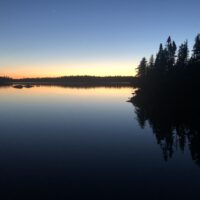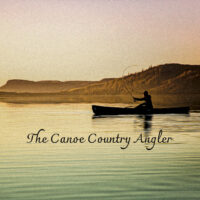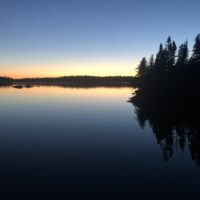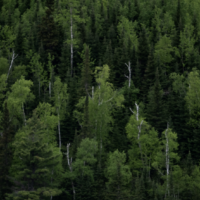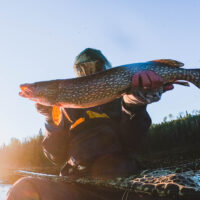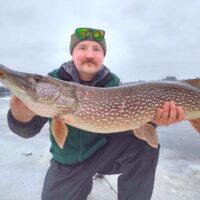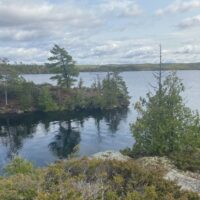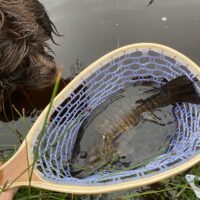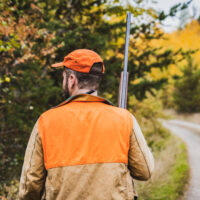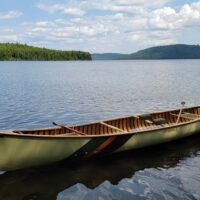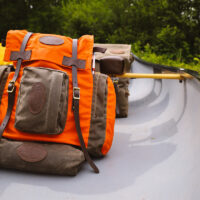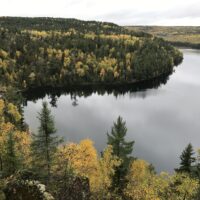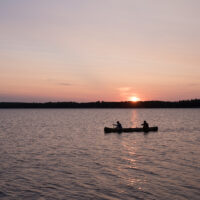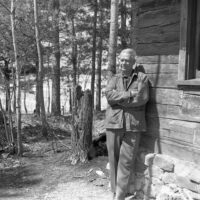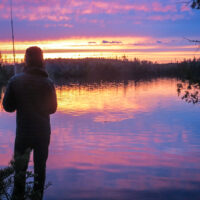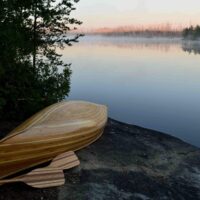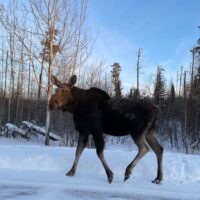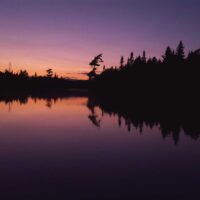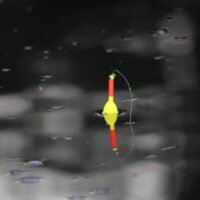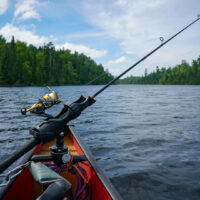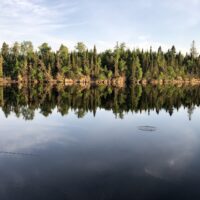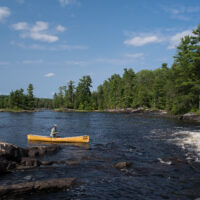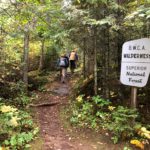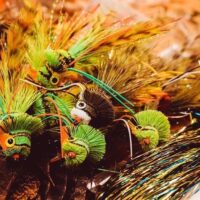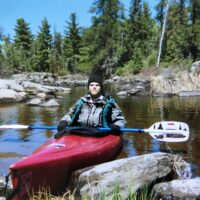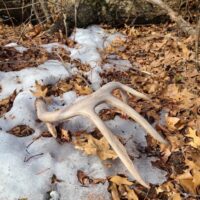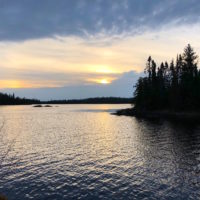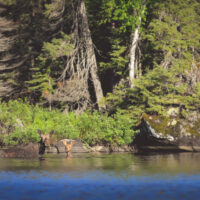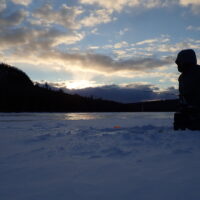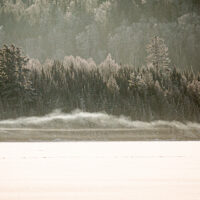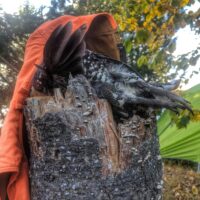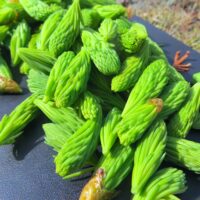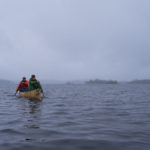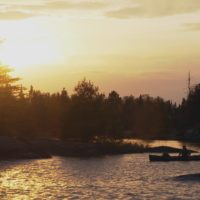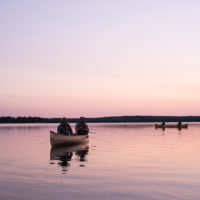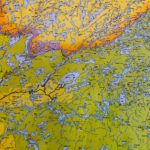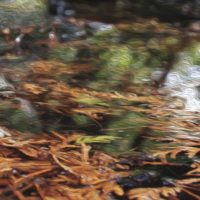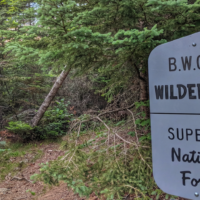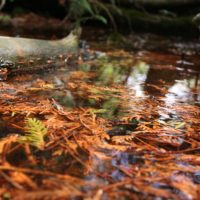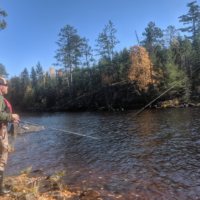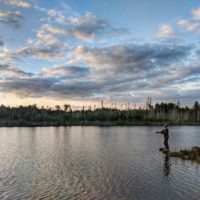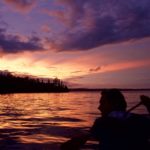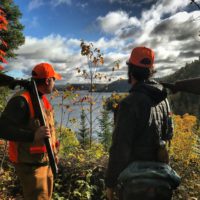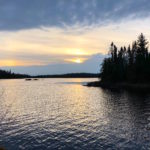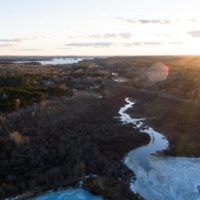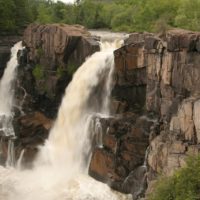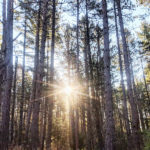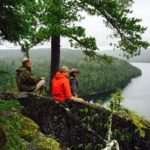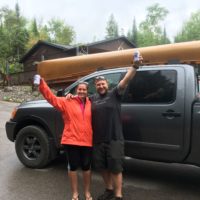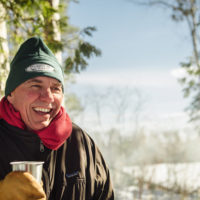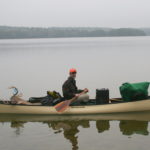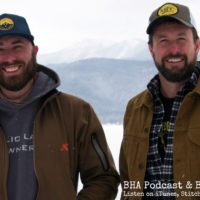Continuing Sigurd F. Olson’s legacy for future generations of hunters and anglers
April 4, 2023 10:38 am“Then we heard a sound we had not expected to hear in broad daylight: the call of the great horned owl, and then an answering call much deeper and more resonant than the first. Back and forth went the booming – Hoo-hooo-hoo-hooooooo – and with it the fear of death came to the cowering snowshoe rabbits down in the alders, to squirrels and mice, to the budding partridge back in the birches, to countless creatures for miles around. One of the most feared of hunting-calls in the north, that sound brought visions of lonely valleys bathed in moonlight, of rivers and lakes and campsites at dusk. No wonder the wilderness lay frozen and still, no wonder the warbling had stopped.”
Birds of the Ski Trails, Sigurd F. Olson, The Singing Wilderness
Today, in honor of Sigurd F. Olson’s 124th birthday, learn about Sig’s legacy to the Boundary Waters and make a gift to Sportsmen for the BWCA to ensure his legacy lives on.
Sigurd F. Olson was a writer, conservationist, and wilderness advocate who played a significant role in protecting the Boundary Waters Canoe Area Wilderness (BWCA). Through his writing and advocacy, Olson helped to raise awareness of the value of wilderness areas and the need to protect them for the benefit and enjoyment of future generations. Sig believed that the character and spirit one felt in the Wilderness were integral to the human spirit, which motivated his advocacy and his drive to inspire the values of many wilderness advocates and travelers who have stepped up at critical times to protect the integrity of the Boundary Waters Canoe Area.
Sportsmen for the Boundary Waters is proud to continue Sigurd F. Olson’s legacy of Wilderness conservation. Sig’s work and writings are foundational to the work SFBW does today, in Congress, state and federal agencies, with our members, partners, and supporters. In addition to SFBW’s advocacy efforts for permanent Boundary Waters protection from proposed sulfide-ore copper mining in the watershed of the BWCA, Sportsmen for the Boundary Waters also advocates on behalf of habitat issues in Northern Minnesota, including a range of issues affecting wildlife, water quality, and the quality of hunting and fishing in the Boundary Waters Canoe Area Wilderness.
Sig’s Legacy in Moose habitat work
One of the key species that depend on the boreal forest is Minnesota’s iconic moose population. The boreal forest, especially the 1.1 million acres of boreal habitat in the Boundary Waters Canoe Area Wilderness, provides critical habitat for moose, which require dense forests with abundant browse, such as young tree growth and shrubs, to feed on. Moose are also adapted to the harsh northern winters, relying on the deep snowpack to access tree branches and twigs otherwise out of reach. However, as moose habitat within the boreal forest is fragmented and boreal forest climate conditions move further north annually, moose populations are declining.
Sportsmen for the Boundary Waters engages with the Minnesota Department of Natural Resources and multiple partner organizations to advocate on behalf of funding for additional moose habitat research and conservation. Additional public funding and private efforts, on public and private land, are critical to ensuring Minnesota’s moose population has the necessary habitat in and around the Boundary Waters to continue to survive.
Sig’s legacy in the effort to protect BWCA from invasive species
The clean water of the Boundary Waters, home to over 1,100 lakes and countless rivers and streams, is threatened by encroaching invasive species, which pose a significant threat to the health and water quality in the boundary waters. Invasive species are non-native plants and animals that are introduced to an ecosystem and can rapidly spread, outcompeting native species and disrupting the balance of the ecosystem. In the BWCAW, invasive species such as the spiny water flea, zebra mussels, Eurasian watermilfoil, and rusty crayfish are growing problems that can have severe consequences for the health of the lakes and rivers.
Sportsmen for the Boundary Waters engages across a host of wildlife councils, both nationally and in the state of Minnesota, to advocate that additional resources be provided to state and federal agencies tasked with protecting the natural resources of the Boundary Waters Canoe Area Wilderness and Superior National Forest from invasive species, already present in other lakes and rivers in Minnesota.
The lasting impact of Sigurd Olson’s advocacy
Olson’s advocacy helped to galvanize public support for the protection of the BWCAW. In 1964, the Wilderness Act was passed, which designated the BWCAW as a wilderness area and provided for its permanent protection. Olson played a crucial role in shaping the act’s language and was present at its signing by President Lyndon B. Johnson.
Beyond his advocacy, Olson’s writing about the BWCAW also helped to raise awareness of the area and its value. His books, including “The Singing Wilderness” and “Listening Point,” captured the beauty and magic of the wilderness, inspiring countless readers to visit the BWCAW and to become advocates for wilderness preservation themselves.




